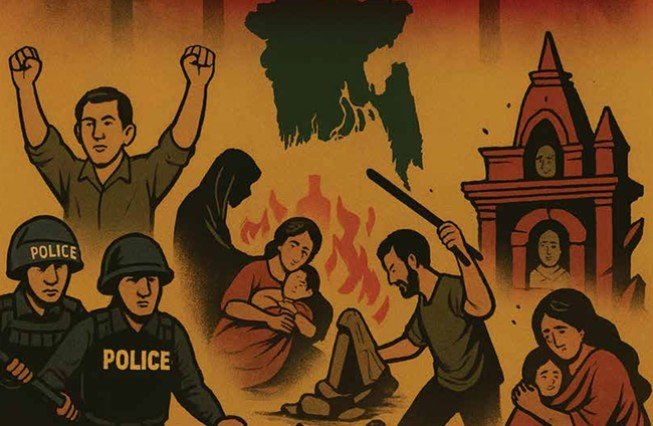World leaders are raising alarms over the latest wave of violence against indigenous communities in Bangladesh’s Chittagong Hill Tracts, spotlighting the tough challenges facing religious and ethnic minorities in the South Asian country.
Human rights groups worldwide have called on Bangladesh’s interim government to crack down hard on those responsible. This outcry follows a deadly clash in Kahagrachari district just days ago, where Bangladeshi security forces unleashed arson, looting, and random gunfire. The attack killed several indigenous people and wounded dozens more.
The violence erupted on September 23 during protests. Locals had gathered to demand justice for a Marma schoolgirl who suffered a brutal gang rape. They wanted the attackers arrested and put on trial, but the response turned tragic.
These events grabbed international attention at the 60th Session of the UN Human Rights Council in Geneva. Adding to the buzz, the International Forum for Secular Bangladesh set up a striking two-day poster exhibition outside the United Nations on Wednesday. The display, featuring 30 panels, shone a light on Bangladesh’s growing problems with radical fundamentalism, communal violence, minority oppression, press freedom crackdowns, mob attacks, and sexual abuse.
Suhas Chakma, director of the New Delhi-based Rights and Risks Analysis Group, addressed the UN council and detailed the horror. He explained that Bangladesh Army troops shot and killed three indigenous protesters while injuring many others as they rallied for justice over the gang rape. “In the past year alone, Bangladesh has seen 637 deaths from mob lynchings, attacks on 878 journalists, 2,485 violent acts against religious minorities, and criminal charges against over 500,000 political opponents,” Chakma said.
He also slammed the interim government led by Muhammad Yunus for firing all members of Bangladesh’s National Human Rights Commission (NHRC) on November 7, 2024. The move came after the commission’s October newsletter flagged rising mob beatings, rapes, political harassment, and assaults on leaders. “No new members have been appointed yet—that’s a shocking neglect of state duties,” Chakma noted. He pointed out that his November 8 complaint to the Global Alliance of National Human Rights Institutions went ignored, with no suspension of Bangladesh’s NHRC despite its current non-existence.
Chakma pressed the UN Human Rights Council to push Bangladesh to quickly refill the NHRC spots and tackle the surge in human rights violations.
Earlier at the same session, Charlotte Zehrer, a UN-EU human rights officer with Global Human Rights Defence, voiced deep worries about ethnic and religious minorities in Bangladesh. She cited more than 2,400 attacks on minorities over the last year, hitting indigenous groups in the Chittagong Hill Tracts hardest, along with Hindus and Christians nationwide.
Zehrer listed the grim details: assaults on worship sites and homes, rape as a tool of gender-based violence, bogus arrests and blasphemy accusations, land grabs leading to forced displacement, ousting of minority professionals, and coerced conversions of teens and young adults.
She demanded the immediate release of wrongly held minority leaders and activists, reforms to laws that target these groups, and independent probes into every reported case of violence and discrimination. Zehrer also called for the world to keep a close watch on protections for Bangladesh’s indigenous peoples and minorities—perhaps through a UN fact-finding mission.
Stay informed on all the latest news, real-time breaking news updates, and follow all the important headlines in world News on Latest NewsX. Follow us on social media Facebook, Twitter(X), Gettr and subscribe our Youtube Channel.



